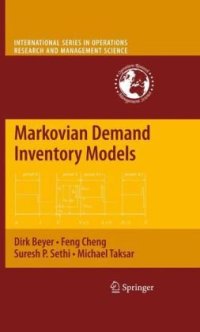
Ebook: Markovian Demand Inventory Models
- Tags: Production/Logistics, Probability Theory and Stochastic Processes, Engineering Economics Organization Logistics Marketing, Mathematical Modeling and Industrial Mathematics, Industrial and Production Engineering, Operations Research/De
- Series: International Series in Operations Research & Management Science 108
- Year: 2010
- Publisher: Springer US
- Edition: 1
- Language: English
- pdf
"This book contains the most complete, rigorous mathematical treatment of the classical dynamic inventory model with stochastics demands that I am aware of. Emphasis is placed on a demand structure governed by a discrete time Markov chain. The state of the Markov chain determines the demand distribution for the period in question. Under this more general demand structure, (s,S) ordering policies are still shown to be optimal. The mathematical level is advanced and the book would be most appropriate for a specialized course at the Ph.D. level."
Donald L. Iglehart
Professor Emeritus of Operations Research, Stanford University
"This book provides a comprehensive mathematical presentation of (s,S) inventory models and affords readers thorough coverage of the analytic tools used to establish theoretical results. Markovian demand models are central in the extensive scientific literature on inventory theory, and this volume reviews all the important conceptual developments of the subject."
Harvey M. Wagner
University of North Carolina at Chapel Hill
"Beyer, Cheng, Sethi and Taksar have done a fine job of bringing together many of the central results about this important class of models. The book will be useful to anyone interested in inventory theory."
Paul Zipkin
Duke University
This text provides a superbly researched insight into Markovian demand inventory models. The result of ten years of research, this work covers all aspects of demand inventory where they are modeled by Markov processes. Inventory management is concerned with matching supply with demand and is a central problem in Operations Management. The central problem is to find the amount to be produced or purchased in order to maximize the total expected profit, or minimize the total expected cost.